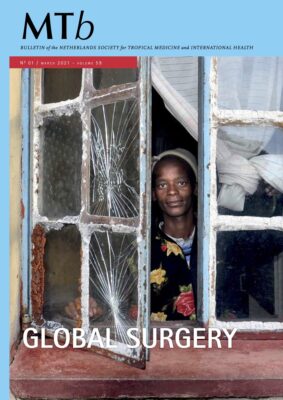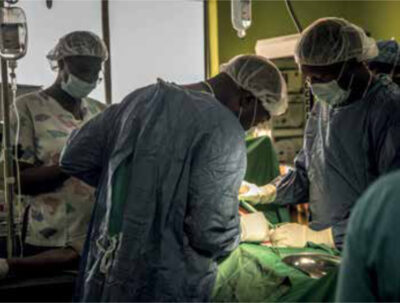
Global Surgery
Editorial
Global surgery: Gearing up into the next decade
A cold wave in the week of the 8th of February put the Netherlands under a blanket of snow. During this single week, more than 40,000 people presented to the Dutch emergency departments after a fall on the ice. Many of these traumatic injuries, most of them fractures, were treated with plaster, but a considerable number needed surgery. After these surgical or non-surgical treatments, patients will get regular check-ups and paramedical care (e.g. physiotherapy) to ensure the fastest and best possible recovery. The presence of such a functioning surgical system with ambulance services, an emergency department, a staffed and stocked operating theatre including anaesthesia services, radiological diagnostic tools, and trained paramedics etc. is considered a normality by many. However, in a large number of countries – especially low- and middleincome countries – these systems have not yet been sufficiently developed.[1] In the case of traumatic injuries such as above, a surgical health system is absolutely indispensable. It is however just one example of why a surgical health system is of vital importance. It is also important for many noncommunicable (e.g. cancer, cardiovascular diseases) and communicable (e.g. typhoid fever, pelvic inflammatory disease, mycetoma) diseases.[2] The 2015 recognition of surgery as a fundamental and unequivocal part of universal health coverage – so that all individuals and communities receive the health services they need without suffering financial hardship – has been an important driver for the further development of surgical care systems. Many multilateral organisations, development finance institutions, (inter)regional institutions and smaller organisations have since made efforts to scale up timely, safe and affordable surgical services across continents and hemispheres.[3] A surgical health system is like a mechanical watch: a complex system of multiple larger and smaller interconnected parts, working together, yet all with their own function and individually pivotal for ultimate performance. Similarly, global surgery is a multidisciplinary field with separate fields and subfields sharing a common goal: to provide improved and equitable surgical care across health systems worldwide. As a result, interdependent progress in the development of surgical systems is complex and takes more time than, for example, the development of so-called single disease programmes. Yet it also offers opportunities: developing the separate elements such as ambulance services, anaesthesia and patient monitoring services will also be beneficial in the treatment of non-surgical diseases through their interdisciplinary applicability. The foundations of global surgery have been laid. This edition of MTb on global surgery reflects on this and also looks forward. The importance of developing surgical health systems is described in a review of its role in cancer care. We discuss the importance of anaesthesia services. There are examples of tasksharing and training programmes as well as reflections on the intentions of surgical missions, the role of mentorship in training programmes, and research-based strengthening of health systems. We hope you enjoy your read and invite you to share your thoughts on one of our social media channels.
Remco van Egmond
References
- Global Surgery 2030: evidence and solutions for achieving health, welfare, and economic development
Lancet. 2015 Aug 8;386(9993):569- 624. doi: 10.1016/S0140-6736(15)60160-X
- Cancer: Disease Control Priorities, Volume 3. 3rd ed. Washington: The International Bank for Reconstruction and Development
2015. 341 p.
- International organisations in global surgery: challenges and opportunities. J Public Health Emerg. 2020
Dec 4;35 doi: 10.21037/jphe-2020-gs-10





















































